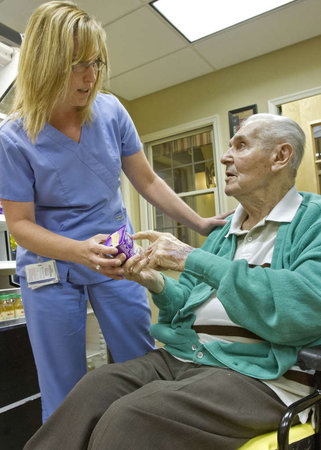|
|
Diabetes in the Elderly
Remains Little Studied
By Stacey Burling, The
Philadelphia Inquirer
June 10, 2012

Photo
Contributed by DAVID M WARREN... Tracy
Kelly, nurse manager at Holy Redeemer Lafayette,
talks with resident Michael Sheplock, 95, who
has diabetes.
A
quarter of nursing home residents have diabetes, but
doctors are only now recognizing that they may need
different medical treatment than younger people with
the disease.
Elbert Huang, a University of Chicago primary care
doctor who conducts diabetes research, bemoans the
fact that clinical trials rarely include elderly
diabetics even though nearly half of people with
diabetes are over 65.
Three recent, large trials of measures to keep tight
control of blood sugar did include older people but
yielded either detrimental results or no benefit.
"If you're taking care of an older person with
diabetes, you're really working in a confusing time,"
Huang said.
He persuaded the
American Diabetes Association to hold its first-ever
session on diabetes in the elderly at its annual
meeting last year. At this year's meeting, being held
though Tuesday in Philadelphia, he drilled down
further, leading a symposium Friday on taking care of
diabetics in long-term care settings. That includes
everything from home care to nursing homes.
Huang, who is on the association's scientific planning
committee, is also part of a consensus panel on
treating the elderly that will soon report to the
group.
"I don't think anyone really knows what the right way
to approach diabetes care in nursing homes is," he
said.
Diabetics are at greater risk of dementia, so Huang
asked one presenter to talk about patients with both
conditions. Another talked about palliative care.
Elderly diabetics, who often are overweight,
frequently have arthritis or other sources of pain. "A
large percentage of them have chronic pain, and it
seems to get worse as they come closer to death,"
Huang said.
The biggest issue is how to balance quality of life
with health in patients who may not have many years
left.
Drug companies tend to test new medicines in
relatively healthy people. It's easier to measure the
impact of one variable - a new drug - when patients
aren't being treated for lots of chronic problems. But
that leaves doctors without key information when they
treat real patients, who are likely to be old and have
lots of things wrong with them.
Nationally, almost 19 million people have been
diagnosed with diabetes, which causes people to have
too much sugar, or glucose, in their blood. Obesity is
an important risk factor. Diabetes causes heart
disease, stroke, kidney failure, and blindness.
The percentage of nursing home patients with diabetes
declines with age, said Helaine Resnick, an
epidemiologist who is president of the consulting firm
Resnick, Chodorow & Associates. Though half of
nursing home residents are over 85, just 13.1 percent
of people in that group have diabetes. The reason:
Diabetics don't live that long.
Diabetes, she said, is an age accelerator that damages
every part of the body. "They get to be a train
wreck," she said.
Barbara Resnick, a University of Maryland geriatric
nurse practitioner and a past president of the
American Geriatric Society, said doctors and nurses
had recently begun to take a more relaxed approach to
diabetes management in nursing homes.
Typically, diabetics are told to keep tight control of
their glucose levels because it helps prevent major
health problems that develop over many years. That's
less important when people don't have many years to
look forward to.
"How important is hyperglycemia [too much sugar in the
blood] when your mother is 99?" she asked. "Do you
really want to say to her, 'You can't go to the
birthday party and eat cake with everybody else.'?"
She gives older people more leeway when it comes to
diet and then uses medication to keep blood sugar
under control. "We let you eat whatever the heck you
want to eat and we regulate your diabetes around
that," she said.
Barbara Resnick, who is not related to Helaine
Resnick, said either too much or too little blood
sugar can cause thinking problems, a particular
concern in a population that already is at high risk
for cognitive difficulty. Too much sugar can also lead
to frequent urination, more infections, and healing
problems.
But too little sugar, or hypoglycemia, is actually a
bigger problem in the elderly, especially people who
may not be able to communicate that they don't feel
well. It can lead to falls and even death, she said.
Mark Mullen, medical director of Holy Redeemer
Lafayette, said the more relaxed medical approach was
difficult for some doctors to accept. It dovetails
nicely, however, with the trend toward more homelike
long-term care and individualized treatment.
If patients weren't very disciplined eaters at home,
Mullen says, nursing homes are now less likely to
impose strict rules on them. As a comfort measure, the
homes also may test for blood sugar less frequently.
"More important than tight sugar control is the
happiness of the resident," Mullen said.
More Information on US Health
Issues
|
|


